Tips for Coping With Depression as a College Student

College years are often described as the best time in a person’s life, filled with new experiences, friendships, and opportunities for growth. However, among these positive aspects lies a widespread issue: depression among college students. Increased academic demands, social challenges, and the stress of transitioning into adulthood can take a toll on mental health. It’s crucial for students and those within their support systems to recognize the signs and know how to manage this condition effectively. Below, we delve into strategies that can help alleviate the impact of depression on college life.
Navigating Academic Pressures Without Compromising Mental Health
Academic pressures are a significant source of stress for many college students, often contributing to the onset or worsening of depression symptoms. Effective management of these pressures is essential for maintaining mental equilibrium. Time management skills, such as breaking tasks into manageable chunks and setting realistic goals, are fundamental.
Finding a balance between academic commitments and leisure time is also crucial. It’s important to schedule regular breaks and ensure that you’re engaging in activities that bring you joy outside of your studies. Setting boundaries and knowing when to step back from work is a valuable skill that can prevent burnout.
For those pursuing competitive fields or postgraduate education, such as an Online Master of Science in Sport Administration, managing expectations and seeking academic counseling can be vital to maintaining mental health. Resources and guidance specific to the field of sports administration can offer tailored coping strategies and support networks.
Understanding Depression in the College Environment
The prevalence of depression in college students has grown significantly in recent times. This mental health condition can manifest in various forms, including persistent sadness, loss of interest in activities, and overwhelming fatigue. It can drastically affect a student’s academic performance, social interactions, and overall quality of life. Recognizing the challenges that contribute to this rise in depression is the first step toward addressing it.
Factors such as separation from family support, academic stress, and the pressure to succeed are often compounded by poor sleep habits and financial worries, commonly reported by those pursuing higher education. The use of digital platforms and social media may also skew perceptions of success and belonging, exacerbating feelings of inadequacy and isolation.
For those struggling with depression, seeking depression counselling can be an essential step. A team of health care professionals such as psychologists and counsellors can assist young adults with navigating severe depression. Reaching out to a provider can help students learn how to manage negative thoughts and get the treatment they need.
Establishing a Supportive Network on Campus
Creating a network of support is one of the cornerstones of managing depression while in college. Friends, family, and professionals can form the pillars of this network, offering emotional assistance and understanding. Engaging in student organizations and campus activities can connect you with peers and facilitate the building of a supportive community.
In addition to personal relationships, academic advisors and counselors can provide guidance and resources. They can assist in developing a balanced course schedule to mitigate academic stress and can be pivotal in establishing connections with other support services on campus.
Peer support groups are another integral component of a supportive network. Being among others who are experiencing similar challenges can alleviate the sense of isolation that often accompanies depression. These groups provide a safe space to share experiences and coping strategies.
Developing Healthy Eating Habits for Mental Well-Being
Diet also plays a critical role in managing depression. Nutritional psychiatry has identified certain dietary patterns that can influence mental health, highlighting the importance of a balanced and healthy diet for improving mood and cognitive function.
College dining options can sometimes be limited to less healthy choices, which may exacerbate depressive symptoms. Making informed food selections and ensuring a variety of nutrients can counter these effects. For instance, maintaining a diet rich in omega-3 fatty acids, fruits, vegetables, and whole grains is recommended.
Staying properly hydrated and minimizing the consumption of alcohol and caffeine can also contribute to better health outcomes. Dehydration and substances that alter mood or sleep can trigger or worsen symptoms of depression.
Altogether, the college experience represents both an exciting journey and a potential set of mental challenges. While depression can be a formidable obstacle, utilizing campus resources, fostering social connections, embracing physical well-being, and maintaining healthy eating habits can empower students to thrive. By proactively addressing academic pressures, students can strike a balance that supports both their educational pursuits and their health.




